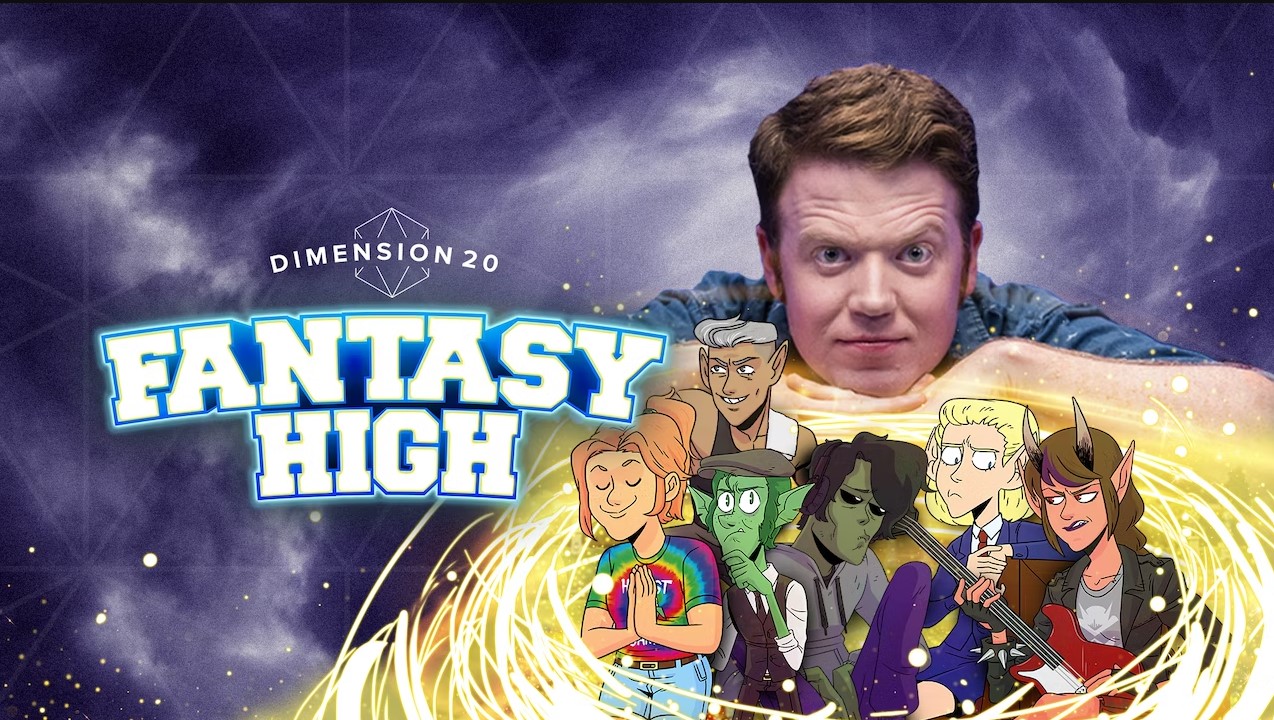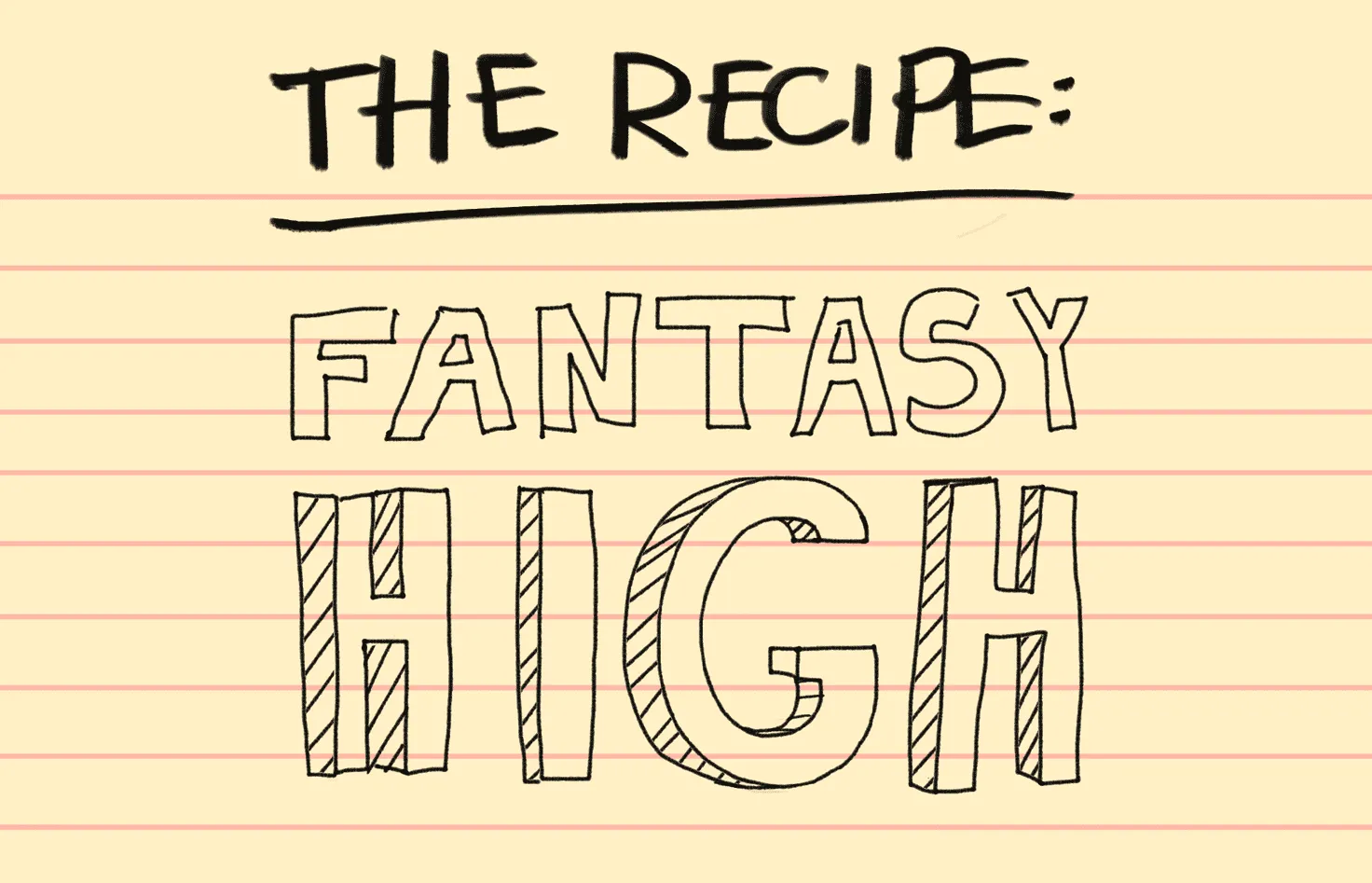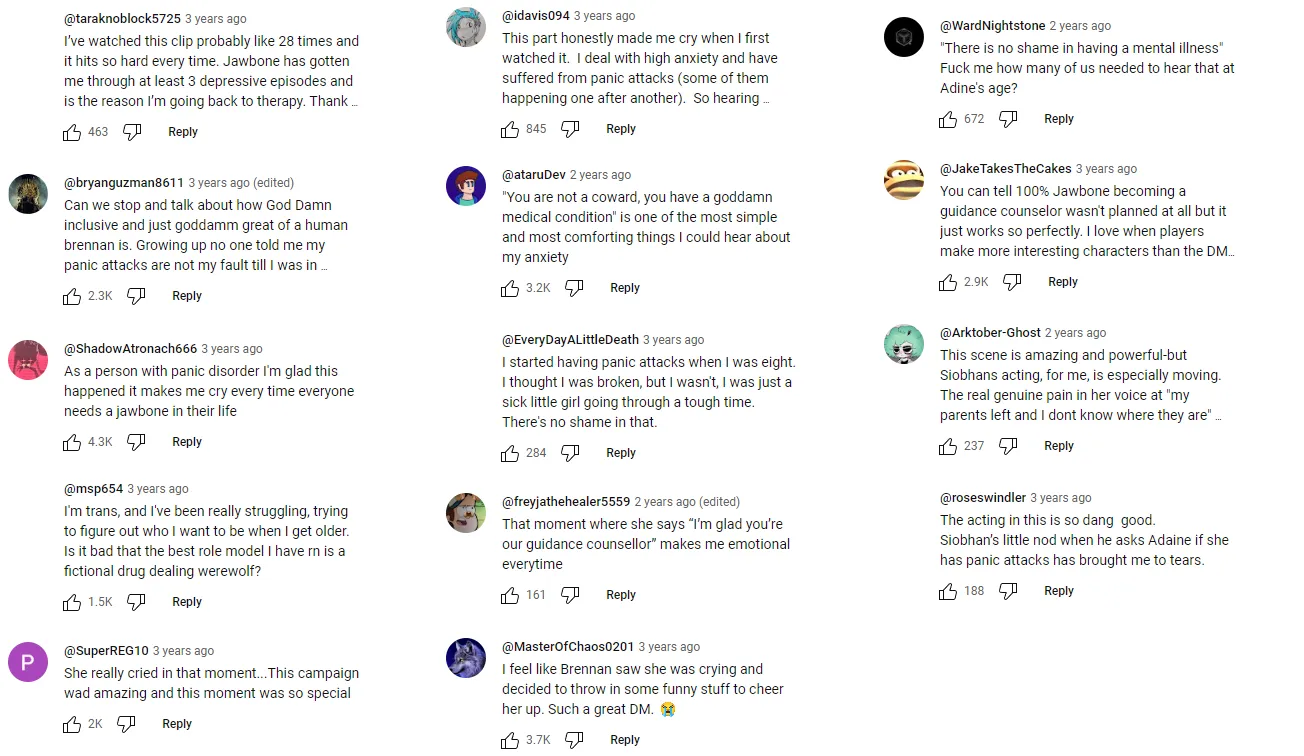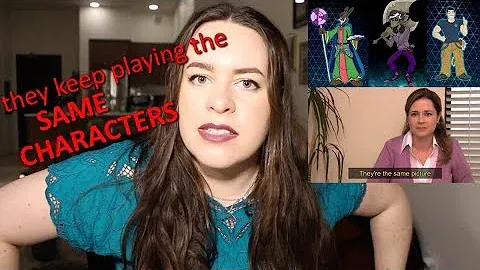The Recipe: Fantasy High

Speaking just for myself, there’s not much difference between food and stories: I need ‘em both to live, my reason for consuming either is frequently emotional, and occasionally, I’ll engage in some truly reckless bingeing. My latest binge was the second season of Dimension 20’s Fantasy High, a D&D “actual play” show which I devoured over the course of a week. I refuse to do the math, but I must have been watching over four hours a night.
Just like with food, it’s much easier to binge certain kinds of stories than others. (Nobody’s burning through The Handmaid’s Tale.) Battlestar Galactica, with its relentless plotting, cliffhangers, and long-running mysteries, was so bingeable it got a Portlandia sketch.
If Battlestar were food, it’d be candy, reliably dispensing that sugary dopamine rush of “WHAT’S GONNA HAPPEN NEXT?” in a way that’s just ephemeral enough to make the next bite/episode a necessity.
FH, as a comedy, is more of a comfort food — chicken noodle soup, let’s say. It’s warm, wholesome, palatable even on an upset stomach. I enjoyed it so much that I want to break down the recipe for you.

In a Familiar Setting, put:
- a dozen good eggs and half a dozen bad eggs. (LEAVE YOLKS UNMIXED)
- 1 part comedy
- 1 part “hey, you okay?”
- a dollop of trauma, to taste
Familiar
The American high school experience is a common denominator for something like 85% of the US population, and probably much higher for D20’s audience. Though funnily enough, I’m pretty sure three of the seven players at the table — Brennan, Lou, and Siobhan — didn’t attend the typical American high school. Brennan was on a home school plan, Lou attended a Catholic boys’ prep school, and I assume Siobhan was conquering the British secondary school curriculum.
Quick tangent: this familiarity is equally important for the show’s marketing appeal. An actual play D&D show appeals to such a tiny slice of the general public that Dimension 20 can’t afford to bleed any more potential viewers with a narrow elevator pitch. So after a high school story, the show:
- brings in Matt Mercer, the biggest fish in the actual play pond
- visits the biggest and most culturally resonant American city, New York City.
- brings in the McElroy family, who have a top-50 comedy podcast
- does a take on Game of Thrones
- does a take on Harry Potter
As a writer trying to establish himself, it’s really interesting to see how other artists solve that bootstrapping problem. When you know you’ve got the goods, the hard part is getting someone to give you a shot. Dimension 20’s strategy is to draft off other popular IPs (The Breakfast Club, Game of Thrones, Harry Potter), and try to get as many warm introductions to established audiences as possible (reaching Critical Role’s fanbase via Matt Mercer, reaching the MBMBAM fanbase through the McElroys).
And there’s really no better pitch than “this product is like that other thing you already love”, particularly now, when we have a paralyzing glut of entertainment options. (I am convinced that part of the nostalgia for Blockbuster was the fact that your choices were constrained by the available shelving in a 2500 sq. ft. storefront.)
But that doesn’t matter — thanks to movies like The Breakfast Club, that prototypical American high school has seeped into the groundwater of Western culture, so we all kinda know how it works. More importantly, we’re comfortable with it. Comfort is a huge part of FH’s appeal, so it’s well worth it to sacrifice the internal consistency of the secondary world for the sake of the audience’s emotional immersion.
Separate Good & Bad
Comfort with the genre and its tropes is a good start, but the reader also needs to trust you, the storyteller. How much trust you need to earn depends on how much you plan to tug on their heart strings. For a story like FH, which is designed to be therapeutic, Brennan Lee Mulligan needs as much as he can get.
Now the most efficient way to convince a prospective viewer that FH comes from a storyteller who is earnest about establishing warm, emotionally safe connections between the players at his table would be to show them this fifteen second clip:
The editor understood their mission: to hang onto this reaction for dear life.
But for those of us without talkback shows, there are some very basic things you can do within your story's text to put the audience at ease.
The first is structural: keep a strongly polarized cast of characters. The good guys are good, the bad guys are bad, and they’re kept distinct. When you do this, the reader can relax the part of their brain that manages complex feelings for ambiguous characters. They can simply refer to the color of the NPC’s hat. Is it white? Then I can let my guard down. Is it black? Okay, enemy nearby, let me enter my combat stance. This type of clarity is crucial for establishing emotional safe zones within the narrative, and these are where growth and healing can happen.
You also don't always have to be 100% trustworthy in your emotional storytelling. (Emotional storytelling ≠ plot. We want surprising plots. We do not want surprising character arcs.) In fact, you shouldn't, because that's boring. I'd guess the ideal ratio is around 9:1 -- nine times out of ten, good triumphs, evil fails, and they all live happily ever after. But once in a while, go rogue. The high level of trust guarantees a high level of shock:
I want to be clear that a strongly polarized narrative is not necessarily static.
Characters can travel between the poles — they just do it very
quickly, and don’t linger in the space between. FH has a number
of surprise villains, who unmask themselves and in a single moment become a
baddie, like
Characters that have the potential to inspire ambivalence — Kristen’s religious fundamentalist parents, Adaine’s cruel and snobby parents — are largely kept off-screen, on the principle of “if you don’t have something nice to say, don’t say anything at all.” I’d have loved to see Kristen at the dinner table with her family, wrestling with her crisis of faith; or learn more about what created the Cinderella-esque homelife that Adaine suffers within. But pursuing those threads would take the characters and the audience into that ambivalent middle ground, which is a non-starter.
Maintaining such a demilitarized zone between good and bad — hell, even honoring such a dichotomy in the first place — may feel inauthentic or overly simplistic, particularly if you were trained in the mainstream literary tradition. Stories are so good at generating empathy that it can feel like a dereliction of duty when you as a writer choose not to do it. But narrative focus is zero-sum, and in the case of the bad parents, spotlighting them would actively detract from the emotional growth of the protagonists, who need a consistent obstacle to overcome.
Comedy
The comedy is my favorite part of FH, but its narrative function is pretty obvious, so I’ll just make two quick points.
1. Jokes are always welcome, because they can balance out any tone. In suspenseful stories they can relieve tension, in sad stories they can add brightness, and in schmaltzy stories they restore a little bite.
2. Jokes bring people together. In season two, Lou Wilson’s character, Fabian, suffers a pretty brutal defeat, and Lou takes it personally. At the start of the next episode, he is slouched so far down his chair he’s practically horizontal.

To fix this, all the other players engage in a game of emotional pin the tail on the donkey. They approach — in character — to offer condolences and some wise words, almost like the receiving line at a wake. They’re doing exactly the kind of social grooming that I’ll describe below.
But it’s not until the group improvises a scene in which Fabian explains the whole mess that the energy at the table is restored. And it doesn’t work through sincerity, but this really funny mortification ritual. Because all these players watched Lou go completely rogue & fuck things up in the previous episode. So now, in character, they tease him with a bunch of “innocuous” questions that just so happen to point out all of his mistakes. And Wilson plays right along, turning the bit into an extremely satisfying meta-apology.
Social Grooming
Mulligan puts his mission statement right there in the name of the setting: these kids live in a country called Solace. So it’s no surprise that this is a story about strong friendships, big hugs, and being picked up when you’re feeling down. This emphasis places it in a proud tradition of what I’ll call You OK? comedies, alongside shows like Friends, Ted Lasso, or New Girl.
There are countless scenes like this in FH, thanks in part to a truly elite parent:child ratio, somewhere north of 2:1. Whenever a PC is feeling glum, there’s a platoon of NPCs that Mulligan can send in to gently knock upon the door, sit at the foot of the bed, and ask that key question: “Hey… you okay?” With two notable, aforementioned exceptions (Kristen and Adaine’s parents), all the parents are lovely and deeply concerned for their kids. And the good vibes aren’t just restricted to characters with a direct genetic stake in the PCs — there’s a super-chill sentient van, a kindly maid named Cathilda, and the werewolf Jawbone, a bouncer-cum-guidance counselor so saintly and compassionate that he puts Jesus Christ — sorry, Helio — to shame. In one scene, Jawbone talks a character through a panic attack.
Now if you haven’t watched FH yourself & are watching that scene without context, it may seem treacly. But take a look at some of the comments:

Almost nobody gets enough love & support. If your story can make up some fraction of that shortfall, even if it just means helping a reader get through a miserable week, that’s a job well done. And to accomplish that, you may have to disregard a lot of received wisdom.
Let’s remind ourselves just how narrow most storytelling advice is. Fiction is everything that’s never happened. A big topic. So when we try to come up with something to say about it, we fall back on the availability heuristic. What’s the first thing that comes to mind, the most fictive of all fictions? We usually land on Greek tragedy, because this was how poetics was introduced to us in high school. This reflexive focus on classical drama is how we fool ourselves into believing that in every scene a character has got to want something, and that they have to be prevented from attaining it, and that the plot has to always be churning forward, and that you can’t take a chunk of time to watch characters brushing tears from each other’s cheeks.
Stop thinking like that. We are not talking about how to make a play, or a novel. Don’t even think about how to tell a story. Think about giving a person an emotional experience. Whenever you catch yourself wondering if a scene helps the story, the only litmus test is: is this something that people would be interested in feeling? The answer is often yes.
A Dollop of Trauma
At the same time, a therapeutic narrative needs to concern itself with more than good vibes and prosocial interactions. If it doesn’t, then it’s just a narcotic, good for numbing and not for healing. FH, beneath all the jokes and bonhomie, does confront some heavy shit: abandonment, inadequacy, sexuality, and every kind of daddy issue. In one of the second season’s best episodes, Mulligan straight up asks the players to verbalize their characters’ deepest fears.
And in one of the scenes stemming from those answers, Mulligan perfectly articulates a very intense fear of mine. Not only is it always invaluable to have a writer put their finger on something you’ve been unable to express, but because FH does all this work to create a zone of comfort, I was receptive to hearing it, and was able to reflect on it. That’s what the therapeutic narrative is all about: creating a safe, stable platform from which the reader can dive into their issues.
I’d like to wrap up with a little hard-won advice. Every book I’ve written has been therapeutic, whether I knew it at the time or not. But my books were more therapeutic to write than they are to read. The recipe I laid out here makes some very conscious deviations from reality, particularly in the handling of protagonists and antagonists + the sheer quantity of carers. These were deviations that I couldn’t afford to make, for the sake of my own healing process. That is an absolutely valid thing to prioritize in your art — just remember that readers “use” fiction in very intentional ways, and if you spurn the possibilities of fiction for being exactly that, fictional, you may be rubbing the reader’s nose in some painful stuff without providing relief. And that may be truthful, but is it kind? A spoonful of sugar helps the medicine go down, or, more to the point: when a parent kisses their kid’s scraped knee, there is no medicine except for the gesture of care itself.
